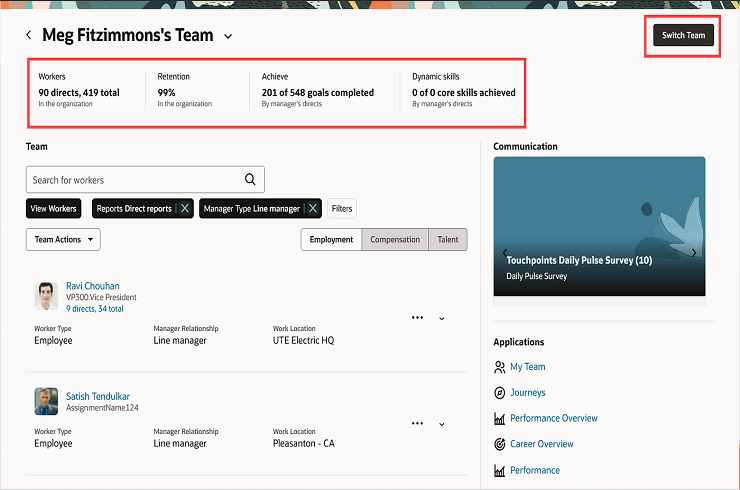Inside the Budney Center For Tech Beha: Innovating Tech and Behavior
Have you ever wondered how technology can change the way we behave and think? The Budney Center for Tech Beha explores this intriguing intersection of tech and human behavior. Located in the heart of Silicon Valley, this center is making waves with its innovative approach to understanding how technology influences our daily lives and mental well-being.
In this article, we will explore the Budney Center for Tech Beha in depth. We’ll look at its history, key personnel, research focus, and the significant projects it undertakes. We will also examine its collaborations with other institutions, the educational opportunities it offers, and its impact on both local and global communities.
The Budney Center for Tech Beha is significant because it combines cutting-edge technology with behavioral science to improve mental health, productivity, and overall well-being. The center’s work has real-world applications that can benefit industries, communities, and individuals, making it a crucial player in today’s tech landscape.

PS: Learn how trendzguruji is the ultimate guide to tech mastery.
Overview of Budney Center for Tech Beha
The Budney Center for Tech Beha is a pioneering institution dedicated to exploring how technology influences human behavior. Founded by Dr. John Budney, the center aims to bridge the gap between technological advancements and behavioral science. Its mission is to research and develop innovative solutions that promote positive behavioral changes and improve mental health and productivity.
The center’s goals include conducting groundbreaking research, fostering interdisciplinary collaboration, and applying their findings to real-world problems. Core values such as innovation, integrity, and impact drive their work, ensuring that their research benefits individuals and communities alike.
Founders and Key Personnel
Dr. John Budney, the visionary behind the center, has a rich background in both technology and psychology. He recognized the potential for these fields to intersect and improve lives. Joining him are Dr. Sarah Kim, a behavioral psychologist known for her work on stress management, and Dr. Mark Tan, an AI and machine learning expert with numerous accolades in tech innovation.
These key personnel play crucial roles within the center. Dr. Budney oversees strategic direction and research priorities, Dr. Kim leads studies on mental health and behavior, and Dr. Tan focuses on developing AI-driven solutions. Their collective expertise and notable achievements make the Budney Center a leader in behavioral technology research.
Location
The Budney Center for Tech Beha is strategically located in Silicon Valley, a hub for technological innovation. This location provides access to a vast network of tech companies, startups, and research institutions, fostering collaboration and resource sharing.
Being in Silicon Valley offers significant benefits, including proximity to leading tech experts and cutting-edge technology. However, it also presents challenges such as high operational costs and intense competition for talent. Despite these challenges, the location enhances the center’s ability to conduct impactful research and drive technological advancements.
Research Focus and Areas
Behavioral technology involves using technological tools and systems to understand and influence human behavior. This field encompasses a range of applications, from mental health apps to AI systems designed to predict and modify behavior.
The importance of behavioral technology in modern research lies in its potential to create tailored solutions that address specific behavioral issues. It allows for precise interventions and has the capacity to improve mental health, productivity, and overall well-being significantly.
Specific Research Projects
The Budney Center is currently working on several notable research projects. One such project involves developing a mobile app that uses AI to provide personalized stress management techniques. This app aims to help users manage stress more effectively by offering tailored strategies based on their individual needs.
Another ongoing project focuses on using machine learning to predict and manage behavioral patterns in patients with chronic illnesses. This research seeks to enhance treatment plans and improve patient outcomes by providing more accurate and timely interventions.
Past projects have also made significant contributions, such as a study on the impact of social media on adolescent mental health. This research provided valuable insights into how social media usage affects young people’s behavior and well-being, leading to recommendations for healthier social media habits.
Impact and Innovations
The research conducted at the Budney Center has led to several impactful innovations. For instance, the stress management app developed by the center has been adopted by numerous healthcare providers, resulting in improved patient outcomes and reduced stress levels.
Other innovations include AI-driven tools that assist in behavioral prediction and intervention, which have been implemented in various healthcare and educational settings. These tools have shown significant promise in enhancing treatment plans and improving behavioral health outcomes.
The real-world applications of the Budney Center’s research demonstrate its significance. By combining technology with behavioral science, the center is creating solutions that not only advance academic knowledge but also offer practical benefits to individuals and communities.
Collaborations and Partnerships
The Budney Center for Tech Beha collaborates with several prestigious universities and research institutes. These collaborations include partnerships with Stanford University, MIT, and UC Berkeley. These institutions bring their expertise and resources, enhancing the center’s research capabilities.
The nature of these collaborations involves joint research projects, exchange programs, and co-hosted seminars. These partnerships allow for a rich exchange of ideas and methodologies, leading to more comprehensive and innovative research outcomes.
The benefits of these academic partnerships are substantial. They provide access to cutting-edge technology, diverse intellectual perspectives, and a broader pool of research participants. Outcomes from these collaborations have included groundbreaking studies and increased publication rates, advancing both the center’s and the partnering institutions’ reputations in the field.
Industry Partnerships
The Budney Center also works closely with various tech companies, including Google, Apple, and IBM. These industry partnerships are essential for translating academic research into practical applications.
Joint projects have focused on developing AI-driven behavioral interventions and stress management tools. These initiatives not only benefit the center’s research but also provide valuable insights and innovations for the partnering companies.
These industry partnerships significantly impact the center’s research and development. They bring in real-world data, additional funding, and the opportunity to pilot new technologies in commercial settings. This collaboration ensures that the center’s research is relevant and immediately applicable.
Funding and Grants
Major financial supporters of the Budney Center include the National Science Foundation (NSF), the National Institutes of Health (NIH), and private donors. These funding sources are crucial for the center’s ongoing research and operations.
The center has received numerous grants, such as the NSF’s grant for developing AI tools for mental health and an NIH grant for studying the behavioral impacts of social media. These grants provide the financial backbone needed to pursue ambitious research projects.
Funding facilitates the center’s research and growth by enabling the purchase of advanced technology, hiring of skilled researchers, and conducting large-scale studies. This financial support is essential for maintaining the center’s high standards of research excellence.
Educational Programs and Opportunities
The Budney Center offers a variety of educational programs, including courses and workshops focused on behavioral technology and AI. These programs are designed for students, professionals, and researchers interested in applying tech solutions to behavioral problems.
Specific courses cover topics such as AI in behavioral science, stress management through technology, and the ethical implications of behavioral tech. Workshops often include hands-on training with the latest tools and software used in the field.
These educational offerings benefit participants by providing them with practical skills and knowledge directly applicable to their careers. They also foster a community of like-minded individuals dedicated to advancing behavioral technology.
Internships and Fellowships
The center provides internship opportunities for both undergraduate and graduate students. These internships offer hands-on experience in research and development projects, allowing students to apply their theoretical knowledge in practical settings.
Fellowship programs are also available, aimed at early-career researchers and postdoctoral fellows. These programs provide mentorship, funding, and the opportunity to lead independent research projects.
Success stories from past interns and fellows highlight the program’s effectiveness. Many have gone on to secure positions at top tech companies or academic institutions, attributing their success to the experience and connections gained during their time at the Budney Center.
Publications and Conferences
The Budney Center is prolific in its academic contributions, regularly producing notable publications in top journals. These publications cover various aspects of behavioral technology, from theoretical frameworks to practical applications.
The center also hosts and participates in numerous conferences, such as the Annual Conference on Behavioral Science and Technology and the International Symposium on AI and Behavior. These events provide platforms for sharing research findings and networking with other professionals in the field.
Through these publications and conferences, the center contributes significantly to academic and professional communities. They help disseminate research findings, foster collaboration, and inspire new studies and innovations in behavioral technology.
Community Outreach and Impact
The Budney Center for Tech Beha actively engages with its local community, ensuring that its research and initiatives directly benefit the people around it. The center hosts workshops and seminars open to the public, providing valuable information on topics such as stress management, digital wellness, and the impact of technology on daily life.
One notable program is the “Tech for Good” initiative, which pairs local high school students with researchers to work on community-focused tech projects. This program not only educates young minds but also creates tech solutions that address local issues, such as mental health resources and educational tools.
Success stories from local community involvement are plentiful. For instance, a collaboration with a nearby community center led to the development of an app that helps residents manage their mental health through personalized techniques. This app has been widely adopted and praised for its user-friendly design and effectiveness.
Global Impact
The Budney Center’s influence extends far beyond its local community. Through international collaborations and projects, the center’s research has had a significant global impact. Partnerships with institutions in Europe, Asia, and Africa have broadened the scope of their work and introduced diverse perspectives into their research.
One example of the center’s global reach is its involvement in a multinational project aimed at using AI to improve mental health services in underserved regions. This project has provided critical resources and support to areas lacking mental health infrastructure, showcasing the center’s commitment to making a global difference.
Examples of the global impact of the Budney Center’s work include a groundbreaking study on the use of AI in predicting and managing behavioral health, which has been implemented in several countries to improve patient outcomes. These international efforts demonstrate the center’s ability to address global challenges through innovative research and solutions.
Case Studies and Success Stories
The real-world impact of the Budney Center’s work is best illustrated through detailed case studies and success stories. One notable example is the development of a mobile app designed to help individuals manage stress. This app uses AI to offer personalized stress management techniques and has been adopted by healthcare providers across the country. Users have reported significant reductions in stress levels, highlighting the app’s effectiveness.
Another success story involves a partnership with a school district to implement AI-driven behavioral interventions. This project has led to improved student outcomes, with schools reporting better behavioral management and enhanced student well-being. The feedback from educators and students has been overwhelmingly positive, demonstrating the project’s success.
Testimonials from beneficiaries of the center’s work further underscore its impact. One user of the stress management app shared, “This app has been a game-changer for me. The personalized techniques have helped me manage my stress better than anything else I’ve tried.” Such feedback highlights the tangible benefits of the center’s research and its positive influence on individuals’ lives.
Through these examples, the Budney Center for Tech Beha showcases its commitment to improving technology and behavior. The center’s work not only advances academic knowledge but also provides practical solutions that make a real difference in communities worldwide.
Conclusion
Reflecting on the Budney Center for Tech Beha, it’s clear that this institution is at the forefront of merging technology with behavioral science. We explored the center’s rich history, key personnel, and strategic location in Silicon Valley. We delved into its research focus, including significant projects and their real-world impacts. Collaborations with academic and industry partners, as well as robust funding, have propelled the center’s innovative work. Additionally, the center’s educational programs and global community outreach further underscore its comprehensive approach to enhancing technology and behavior.
The overall significance of the Budney Center for Tech Beha lies in its unique ability to bridge the gap between technology and human behavior. By addressing real-world problems through interdisciplinary research and practical applications, the center not only advances academic knowledge but also makes a tangible difference in people’s lives. Its work in mental health, AI, and behavioral interventions showcases the potential of technology to improve well-being and productivity on both local and global scales.
I encourage you to engage with or support the Budney Center’s initiatives. Whether you are a student, a professional, or simply someone interested in the intersection of tech and behavior, there are many ways to get involved. Visit their website, attend their workshops, or consider donating to support their groundbreaking research. By contributing to the Budney Center for Tech Beha, you can be part of a movement that is making significant strides in understanding and improving the ways technology influences our lives.







